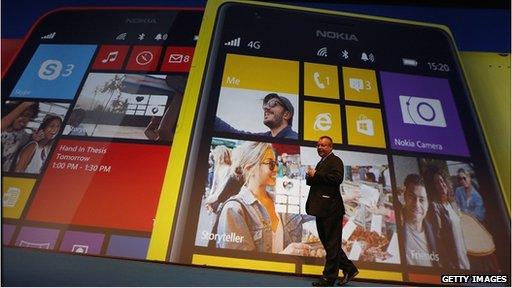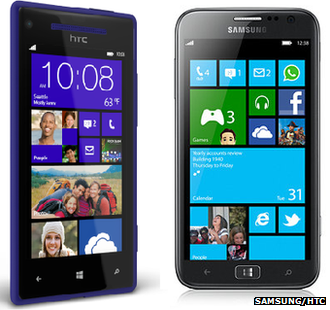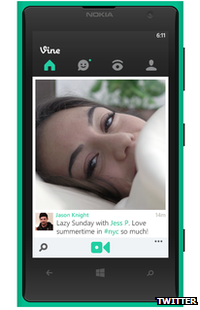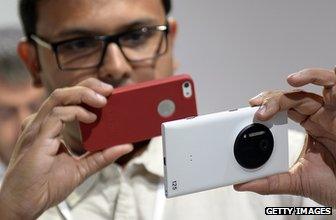Windows Phone 8: Microsoft's breakthrough moment?
- Published
Belfiore: "A lot of people would have counted us out"
Windows Phone 8 users have often had that sinking feeling of being the stragglers in the smartphone app race.
But on Wednesday they were handed a dose of good cheer as not one, but two blockbuster apps launched on the platform: Waze - Google's newly acquired crowdsourced navigation app - and Instagram, the "must-have" Facebook-owned photo-sharing social network, which boasts 150 million registered users.
WP8 photo enthusiasts have been using an unofficial Instagram app, 6tag, since the summer.

The Instagram Beta app still lacks some video functions
But a full three years after it launched on Apple's iOS and a year after it first figured on Android, Instagram's official appearance, external in the Windows Store is equally as significant for its symbolism.
More than anything it's a reflection that, a year after launch, Microsoft's mobile operating system is finally showing signs of maturing.
Nearly all the major apps are now available, from Angry Birds to Netflix.
Growing demand
The needle now seems to be pointing in the right direction for market share, too, in certain scattered corners of the globe.
WP8 makes up one in 10 smartphones sales in Europe - it actually overtook iOS in Italy between July and September, according to research firm Kantar, external.
Perhaps more significantly, it is making gains in some developing markets, which could potentially provide rich pickings for the emerging OS, as feature-phone users upgrade to smartphones for the first time.
If these figures do indeed mark the beginning of a Phoenix-like resurgence for Microsoft, it's not before time.
Microsoft rebooted its mobile offerings with Windows Phone 7 three years ago as part of a wider re-engineering of much its software family.
At the time, Microsoft's chief executive Steve Ballmer told me he was incredibly excited by its new offering. WP7 was, he said, "people-centric" - offering a fresh approach to combining a user's social connections and their smartphone activity.
For business, the mobile software held out the promise of tight integration with other Microsoft services like Exchange and Office.

Microsoft will make its own handsets after securing the takeover of Nokia's handset unit
And it came with other innovations, including "live tiles" - homescreen widgets displaying updated information on everything from news to weather without having to launch the apps themselves - a feature Windows Phone chief Joe Belfiore tells me was akin to "turning the face of your phone into a mirror image of what's important in your life".

It is not yet clear how other Windows Phone-makers will deal with Microsoft's
But for too long, Windows Phone has flattered to deceive. Initially unveiled to critical acclaim of its concept, the OS failed miserably in execution.
Even diehard Windows fans derided WP7 as buggy and incomplete. Unlike its competition in Android and iOS, updates and fixes were in short supply.
Missing apps
Adding insult to injury, too many features of native apps have been proprietary, shut out to Android and iOS users, and therefore limited in their application for Microsoft users too who had friends on those alternatives.
WP8 solved some of those issues but the damage had been done - and reputations stick.
The biggest problem for Microsoft is that it has been caught in a vicious circle.
In a world where apps are king, the Windows maker has found itself the unlikely challenger, scrapping in a marketplace dominated by two behemoths.
With limited demand, there had been little to tempt app developers to plough scarce engineering wherewithal into app development.
In many ways this has been the cruellest of ironies, and a particularly bitter pill to swallow: Microsoft helped pioneer smartphones in the form of Pocket PC and Windows Mobile, only to let the platform stagnate before Steve Jobs reinvigorated it with the iPhone in 2007.
Now, after what Joe Belfiore tells me has been a challenging few years, WP8 is finally approaching the critical mass of apps to make it attractive, not just to first-time smartphone users but also to seasoned aficionados wanting a fresh take on the smartphone experience.

Twitter's Vine app also launched on WP8 this month
Redmond's forthcoming acquisition of Nokia, approved earlier this week, should help it along the way, too. Nokia enjoys a strong brand recognition in some of the developing territories WP8 is looking to conquer, and it has recently added some impressive handsets to its stable.
But Microsoft cannot afford to rest on its laurels. Even though research firm IDC says it has recorded impressive year-on-year growth, external.
It has no presence to speak of in many countries, including the biggest emerging market, China, where the lowest-end Nokia handset struggles to compete with a rash of Android phones costing the equivalent of £30.
As Bryan Wang, mobility analyst for Forrester Research, tells me, pricing is key.
"Microsoft needs to identify the right strategy to tempt users away from Android, but even if it's successful it will take at least one-to-two years to achieve critical mass," he says.
Here in the US, Windows Phone market share still sits at under 5%. And while Blackberry's demise offers clear opportunities for Microsoft to capitalise, there's no room for complacency.

Mr Belfiore's children helped him promote Windows Phone's Kid's Corner safety feature
Even the Instagram launch, which should have played to the platform's perceived strengths in photography, has been beset by an all-too-familiar chorus of groans that it lacks the same feature set - including video recording and sharing - and ease of use as its counterpart on other platforms.
It's a refrain heard commonly from the Windows community about other WP8 apps, too.

Windows Phone's market share may be growing, but global sales still lag far behind Android and iOS
That kind of publicity is a harsh reminder of the job that lies ahead for Joe Belfiore and his team: to convince consumers that the dual offering of Windows Phone and Nokia hardware really is a compelling combination.
You certainly wouldn't bet against Microsoft, a company with deep pockets.
And you wouldn't bet against Joe Belfiore, either. He's ridden out the storm so far, perhaps in part due to his unfalteringly cheerful disposition.
"I'm a marathon runner," he tells me. "When you take on big challenges you have to have a good appreciation of what it's going to take to reach your end goal."
You can follow Richard on Twitter @RichTaylorBBC, external.
- Published22 October 2013
- Published29 October 2012